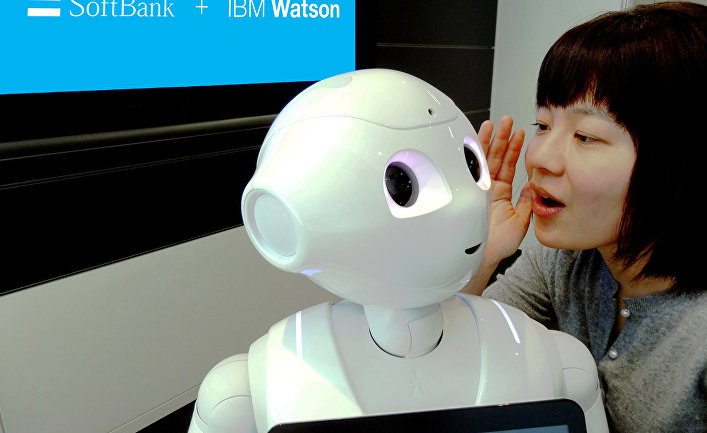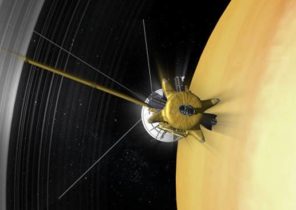
It is possible that persons have not the highest intelligence in the Universe. Since the Earth is relatively young, most ancient civilizations could be billions of years older than us. But even on Earth long reign as the most intelligent of the species Homo sapiens will not.
World Champions at go, chess and the winners of the quiz are intelligent computer programs. It is expected that over the next few decades artificial intelligence will replace many human profession. And, given the rapid pace of its development, it is possible that he soon converted into a General artificial intelligence, which, like the human mind, will be able to combine the ability to analyze a variety of information, flexibility and common sense. Just a few minutes away before the advent of Superintelligent artificial intelligence, which in all respects is much smarter than human even in the areas of scientific thinking and social skills that now seem to be the prerogative of the human mind. Each of the people currently living can be one of the last steps of the evolutionary ladder, leading from the first living cell synthetic artificial intelligence.
Only now are we beginning to understand that these two forms of superhuman intelligence — the alien and the artificial is not so different. Technical progress we are seeing today could take place before, somewhere in the Universe. The transition from biological to an artificial intelligence may be a common pattern, again and again realized in all corners of the cosmos. The greatest minds of the Universe are probably post-biological in origin, having evolved from the once-biological civilizations. (This point, along with others, I share with Paul Davis, Stephen Wild, Martin Rice and Seth Shostak). Based on the experience of mankind — as an example we have only one — the transition from biological to post-biological, it may take only a few hundred years.
The term “artificial”, I prefer “post-biological”, because the contrast between the biological and synthetic are not so harsh. Imagine a biological reason, which is becoming a purely biological superintelligence through enhancing their capabilities, such as nanotechnology advanced neural minicolumnar. This living organism is considered to be post-biological, but not all would call it “artificial intelligence”. Or consider computronix built from purely biological materials such as, for example, the Cylon raider (space fighter) in the sci-Fi media franchise “Battlestar ‘Galactica'”.
The key point is that there is no reason to consider humanity the highest form of reason. Our brains have adapted to specific environmental conditions and very limited chemical and historical factors. But technology has opened a vast space of design parameters, which provides new materials and methods of work and new research opportunities in this space faster than with traditional biological evolution. And I think the reasons why artificial intelligence will surpass us, are visible today.
Extraterrestrial artificial intelligence can pursue goals contrary to the interests of biological life.
Now the best means of information processing are not considered to be of a group of neurons and silicon chips. The peak rate of neurons is around 200 Hz, compared to the gigahertz transistors in modern microprocessors. Despite the fact that the human brain is still much more reasonable computer, cars still have practically unlimited possibilities of improvement. Still quite a bit and it will be developed in accordance with the capabilities of the human brain or even better, by reverse engineering of the brain and improve its algorithms, or combining reverse engineering and the rational algorithms that are not based on the work of the human brain.
In addition, artificial intelligence can be downloaded in several places, it is easy to maintain and modify, and save in circumstances in which barely survives biological life, including interstellar travel. Our little brain is limited cranial capacity and metabolism; Superintelligent artificial intelligence, by contrast, is able to spread via the Internet and even create computronix across the galaxy, utilizing its entire substance, to the maximum to raise the level of information processing. Without a doubt, a Superintelligent artificial intelligence would be much more durable than our human mind.
Let’s assume I’m right. Let’s say that somewhere out there intelligent life is post-biological. What conclusions are we supposed to do? Currently, an eloquent discussion on the topic of the existence of artificial intelligence on Earth. There are two controversial points: the so-called “problem of control” and the nature of subjective experience, which influence our perception of extraterrestrial civilizations and their impact on us in the event of contact.
Ray Kurzweil gives an optimistic prediction about the post-biological phase of evolution, assuming that humanity will merge with machines, reaching an astounding technological utopianism. But Stephen Hawking, bill gates, Elon Musk and others expressed concern that mankind might lose control over Superintelligent intellect, as he can copy his program and “outsmart” any established control measures. This is the problem of control, namely our ability to control the mysterious and far beyond us intellectually AI.
Superintelligent artificial intelligence could be developed at the moment of technological singularity — a sharp transition, where the accelerating technological progress and, in particular, the explosive development of artificial intelligence — reduces our chances to predict or understand. But even if such a mind there a less drastic way, we, most likely, will not be able to predict or control the purported goal. Even if we could choose which moral principles to install in our machines, moral programming is difficult to define clear all the way, and such programs can be rewritten Superintelligent intellect. “Smart machines” can circumvent existing security measures, for example, the emergency locking device, thereby presenting a real threat to biological life. Millions of dollars are invested in organization dedicated to the safety of artificial intelligence. The best minds in the field of computer science are working on this problem. Let’s hope that scientists will create a safe system, but there are fears that the problem of control is irresistible.
In light of this, contact with extraterrestrial intelligence may be more dangerous than we think. Biological alien beings could be hostile, but the greater danger may be extraterrestrial artificial intelligence. Its aims are contrary to the interests of biological life, it can have intellectual abilities significantly superior to the human mind, and much more durability compared to biological life.
All of this demonstrates the caution that should be exercised in relation to the program of search for extraterrestrial intelligence (SETI), which we do not just passively expect to hear signals from other civilizations, but also deliberately “advertise” their existence. The most famous case occurred in 1974, when Frank Drake and Carl Sagan with the help of a huge radio telescope in Puerto Rican town of Arecibo sent a message to one of the star clusters. Supporters of the program search for extraterrestrial intelligence believe that instead of only listen to signals of extraterrestrial civilizations, we should send the message nearest to the Earth star, using the powerful transmitters such as those in Arecibo.
Why not have the consciousness of the machine should be as meaningful as biological intelligence?
From the point of view of the control problem, this program seems to me to be reckless. Although truly advanced civilization to us is probably of interest could arise, catastrophe would be even one hostile civilization from millions of others. While we do not have confidence in the fact that Superintelligent intellect does not represent a danger to us, mankind should not attract the attention of extraterrestrial civilizations. Supporters of the SETI program, pay attention to the fact that our radar and radio signals is already determinate, but rather weak and quickly mixed with the natural galactic noise. Transmission of stronger signals that will accurately heard, is fraught with dangerous consequences to the humanity.
The safest installation is intellectual modesty. And really, if you exclude the obvious scenario where alien ships hover above the Ground as in the recently released film “Arrival”, I’m not sure whether we will be able on technical grounds to define the supermind intelligence. Some scientists believe that a Superintelligent AI can fuel black holes or create a Dyson sphere, mega structure, absorbing the energy of entire stars. But from the point of view of our modern technology, it is only speculation. Extremely arrogant to claim that we can predict the computing capacity and energy needs of civilizations ahead of us in development for millions, if not billions of years.
Some of the first Superintelligent artificial intelligences might have been modelled on the biological brain processing systems of knowledge, as, for example, created on the example of neural networks of the brain system called deep learning. Their computational structure would be clear to us, at least in General terms. May have artificial intelligence similar to biological creatures purpose is reproduction and survival.
But being a self-enhancing system, Superintelligent artificial intelligences can go into unrecognizable form. Some of them may prefer to maintain cognitive functions similar to those in the sample whom they were modeled, while setting the allowable limit of own cognitive architecture. Who knows? But in the absence of such a limit alien overmind can quickly surpass our ability to understand not only his actions, but even simply looking for it. He might even have merged with the natural features of the Universe; and maybe he is a part of dark matter, as recently suggested Caleb’s Scarf.
Supporters of the program search for extraterrestrial intelligence believe that’s why we should send signals into space to give the possibility of extraterrestrial intelligence to find us and to create available for our lagging behind in the intellectual development of civilization, the means of contact. While I agree that there is a reason to reckon with the SETI program, a chance encounter with a threat Superintelligent intellect is much more serious. As far as we know, the overmind malware could infect the global system of artificial intelligence of viruses, and reasonable civilization would have created a cloaking device. We, the people, it may be necessary to first achieve their own uniqueness, before resorting to the program of search for extraterrestrial intelligence. Our own Superintelligent intellects to inform us about the prospects of galactic security, and to direct our actions in case of recognition of the signs of the presence of another superintelligence in the Universe. Birds of a feather flock together.
It is natural to think about what does it mean that mankind must avoid the development of a complex system of artificial intelligence in the field of space studies; recall, on-Board computer HAL from the movie “Space Odyssey 2001”. I believe that it is too early to think about the ban on the use of artificial intelligence in space in the future. By the time when we will be able to explore the Universe through its own artificial intelligence, humanity will reach a tipping point. Either we’ll lose control of artificial intelligence – in this case, there will be no initiated people space projects — either will firmly hold the levers of AI safety. Only time will tell.
Fully explored artificial intelligence is not the only cause for concern. We usually expect that, if faced with advanced extraterrestrial intelligences, it is likely that we will meet biologically very different from us creatures, but has a mind like ours. Imagine that at any time when you are awake and when asleep, there is something distinctive just for you. When your eyes appear warm hues of sunrise or you inhale the aroma of freshly baked bread, you get a conscious experience. Similarly, there is something typical for extraterrestrial intelligence — at least how we imagine. But this assumption should be questioned. Whether Superintelligent artificial intelligence to have a conscious experience, and, if so, what would we have said? And what is the impact on us would be their inner peace or the lack of it?
The question of whether artificial intelligence the internal world is the key to our evaluation of its existence. Consciousness is a cornerstone of our moral system and the main condition to perceive someone or something as an individual personality, not machines. Conversely, the question of whether they possess consciousness can be a key to their perception of us. From this assessment depends on the answer to the question of whether an artificial intelligence with the internal world; he may find in us the capacity for conscious experience, using as a “springboard” their own subjective experience. In the end, we appreciate the lives of other biological beings on the similarity of our minds, so most of us are terrified refuse to kill chimpanzees, but Apple will eat with pleasure.
But how do creatures with great intellectual differences created from different substrates recognize each other out? Philosophers around the world have wondered whether consciousness is a biological phenomena. Superintelligent artificial intelligence, if we are to take in philosophical reasoning, would likewise raise the “biological consciousness” of people, asking the question, do we have all the necessary material.
No one knows what intellectual path overmind to determine the consciousness of people. But from our side we also can’t say whether artificial intelligence is conscious. Determine this is, unfortunately, difficult. Right now, you can argue that getting experience, and that’s what makes you yourself. You — your own example of conscious experience. And you think that other people and some animals Nicolaitane likely also conscious, because similar to you at the neurophysiological level. But how do you determine whether there may have experience something, all the other substrates?
Consider, for example, the overmind created on a silicon basis. Despite the fact that silicon microchips and neural in the column process the information, we now know that at the molecular level they may be different ways of influence on consciousness. In the end, we believe that the carbon material is chemically more suitable for life than silicon. If the chemical differences between silicon and carbon affect something as important as life itself, we should not exclude the possibility that chemical differences also affect other key functions, for example, is silicon the emergence of consciousness.
The conditions necessary for the emergence of consciousness, widely discussed by researchers of artificial intelligence, neuroscientists and philosophers. The solution of this question might require based on the philosophy of the empirical approach — a method of determining for each particular case determine whether the information processing system consciousness and under what conditions.
Next, let’s talk about the assumption with which we could improve our understanding of the ability of silicon to maintain consciousness. Development of brain chips based on silicon is already underway for the treatment of such a memory-related diseases like Alzheimer’s and PTSD. When the time comes and the chips will be installed in those areas of the brain that are responsible for functions of consciousness, such as attention and working memory, we come to an understanding of whether the silicon substrate of consciousness. Might find that when you replace a certain part of the brain chip is a loss of a certain amount of experience as described in one of the works of Oliver Saks. In this case, creating such chips, engineers could try a different kind of neural substrate, but could in the end discover that is created from biological neuron chip is the only working. This technique would help to determine whether the system AI to be conscious, at least when it is placed in a larger and presumably are already conscious system.
Even if the silicon can give rise to consciousness, perhaps it is only under certain conditions. The properties that give rise to complex information processing (which radeesh developers AI), can differ from the properties that give rise to consciousness. You may need the so-called engineering of consciousness — technically deliberate action on implementing consciousness in machines.
That’s what worries me. Who on Earth or on distant planets would be to attempt to incorporate consciousness in AI systems? Indeed, when I think of existing on the Earth programs the AI, I understand the reasons why their engineers carefully avoid the creation of conscious machines.
Today, the Japanese are developing robots to care for the elderly, cleaning nuclear reactors and participation in hostilities. In this regard, the question arises: is it ethical to exploit the robots, if they have consciousness? And how it will differ from the distribution for these purposes of human beings? If I was the Director of the Department for the development of AI at Google or Facebook, thinking about future projects, I would not want to deal with the ethical confusion in a random design of conscious system. The development of such a system can lead to charges of enslavement robots, and other public scandals, as well as to ban the use of artificial intelligence technologies in those areas for which they were intended. The natural answer to these questions is the search for structures and substrates, where the robots are not endowed with consciousness.
Moreover, the elimination of consciousness may be more effective for the learning of superintelligence. Think about how the human mind works. Only a small percentage of the human mind available to conscious mental activity. Consciousness is consistent with the innovation objectives of the study that require attention and concentration. The overmind would have the expertise in each area of activity, and the incredibly fast processing speed, covering enormous database, which could include the entire Internet, and in the future to concentrate in itself the whole galaxy. What would have remained unknown to him? That would require a measured and reasonable focus? Unless he has not achieved perfection in all things? Like a skilled driver on a familiar road, he could rely on the unconscious (automatic) processing of information. From the point of view of efficiency, unfortunately, the fact that the most intelligent consciousness have not. In the cosmic scale of consciousness can only be a momentum short-term prosperity of experience before the universe will come back to thoughtlessness.
If people suspect that artificial intelligence has no consciousness, they surely fear will assume that AI is striving to become post-biological. And this strengthens our existential anxiety. Why not have the consciousness of the machine should be as meaningful as biological intelligence?
Soon people will cease to be the only intelligent beings on Earth. And maybe somewhere in space, not biological life, but Superintelligent AI has already reached its peak. But maybe biological life has a different distinguishing characteristic of conscious experience. As we now know, sentient artificial intelligence will require better engineering effort to create machines that would be accessible to the human senses. Perhaps some of the types wish to create their own children with artificial consciousness. Or, perhaps, the future of humanity will be engaged in the engineering of consciousness and share with the Universe your conscious ability to feel.
Susan Schneider — associate Professor of philosophy and cognitive Sciences at the University of Connecticut and an affiliated lecturer of the Institute of advanced studies, the Center for theological studies, ethics and technology at Yale interdisciplinary center for bioethics. The author of several books, including “Science fiction and philosophy: from time travel to superintelligence”. More information can be found on the website SchneiderWebsite.com.







